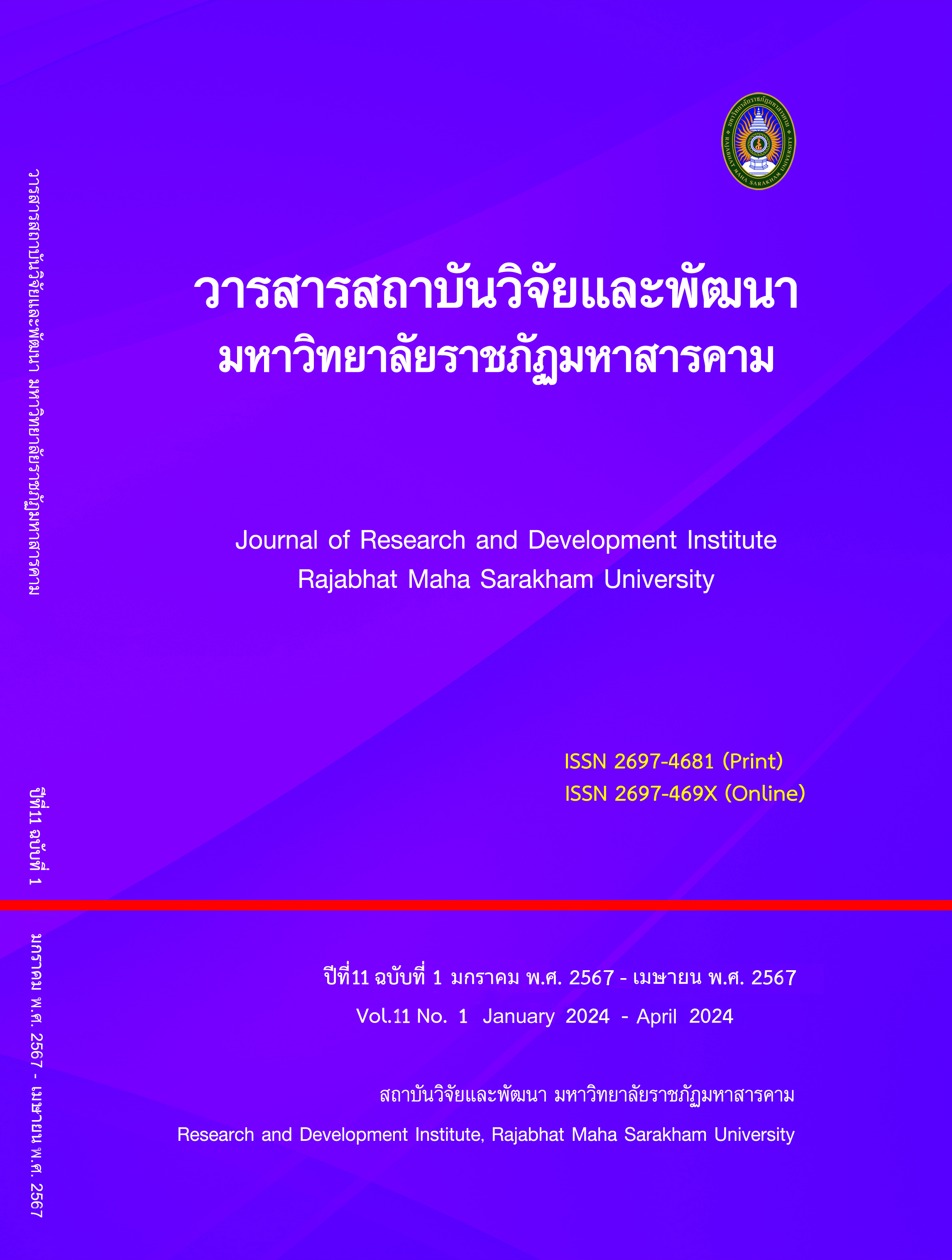THE COMPARISION OF PROBLEM SOLVING SKILL AND ABILITY OF CREATIVE WRITING FOR GRADE 1 STUDENTS IN THE SOCAIL STUDIES S 11101 USING SYNDICATE LEARNING MANAGEMENT WITH MIND-MAPPING TECHNIQUE
Keywords:
Problem solving skill, Creative writing ability, Syndicate learning management, Mind-mapping techniqueAbstract
The purposes of this study were 1) to compare the pretest’s and the posttest’s scores of problem solving skill of grade 1 students using Syndicate learning management with mind-mapping technique. 2) To compare the pretest’s and the posttest’s scores of creative writing ability of grade 1 students using Syndicate learning management with mind-mapping technique. The sample were 35 grade 1 students (studying in class 1/3) at Banthum (Thumprachanukroh) school, randomly selected by the cluster random sampling method.
This study employed a pre-experimental design (One Group Pretest – Posttest Design). The research instruments included 1) the learning management plans using Syndicate learning management with mind-mapping technique, 2) problem solving skill test, and 3) creative writing ability test. The statistics for data analysis comprised Mean, Standard Deviation, and t-test.
The results of this research showed that:
1) Problem solving skill of grade 1 students after being taught by Syndicate learning management with mind-mapping technique were higher than before at the .05 level of statistical significance.
2) Creative writing ability of grade 1 students after being taught by Syndicate learning management with mind-mapping technique were higher than before at the .05 level of statistical significance.
References
Apisit, T. (1979). Syndicate teaching. Kuruparitat, 9, 36-37.
Banthum (thumprachanukroh) School. (2021). Self Assessment Report of Banthum
(thumprachanukroh) School B.E. 2563 (A.D. 2020). Khonkaen.
Eberle, B., & Stanish, B. (1996). CPS for Kids: A Resource Book for Teaching Creative Problem-Solving to Children. Waco, Texas: Prufrock Press.
Garcia, J., & Michaelis, J. U. (1996). Social studies for children: A guide to basic instruction 11th ed. Boston: Allyn & Bacon.
George, M. R. (2013). Effectiveness of self learning package in developing awareness about child care among future teachers at secondary school level. GYANODAYA-The Journal of Progressive Education, 6(1), 22-29.
Greenberg, J., & Baron, R. A. (1993). Behavior in organization 4th ed. New York : Simon & Schuster.
Innoy, A. (2012). Learning achievement in study economic of Pratomsuksa 3 students at Srinakharinwirot University Prasarnmit Demonstration School (Elementary) after using Mind Mapping technique in the experiment in social science department. Research report Srinakharinwirot University.
Intakanok, S. (2016). Creative writing. Udon Thani : Udon Thani Rajabhat University.
Ministry of Education. (2008). The Basic Education Core Curriculum B.E. 2551 (A.D. 2008). Bangkok: Kurusapa Printing Lad-phrao.
Mulkhum, S. (2004). Strategies for teaching problem solving. Bangkok, Parbpim Printing.
Panich, V. (2012). Learning Strategies for Student in 21st Century. Bangkok : Sodsri- Saritwong Foundation.
Panlinfa, P. (2006). A study on learning achievement and self-discipline of
mathayomsuksa II in learning Buddhist doctrine through inquiry method with concept mapping techniques and syndicate teaching method with case study techniques. Master thesis, M.Ed. (Secondary Education). Bangkok : Graduate School, Srinakharinwirot University.
Promchat, P. (2006). Effects of Cooperative Learning by STAD and Syndicate Methods on Creativity and Social Studies Achievement of Matthayomsuksa Two Students. Master of Education in Educational Psychology Prince of Songkla University, Pattani.
Sinturawet, S. (1999). The aim of quality education. Bangkok: Watana Panich Publishing.
Srisa-ad, B. (2002). Preliminary research (7th ed.). Bangkok: Suweeriyasan.
Weir, J. J. (1974). Problem solving is everybody's Problem. The Science Teacher, 41(4), 16-18.
Wihoktoh, T. (1990). Teaching style. Journal of Educational Research. 20(3): 70-71. (in Thai)
Downloads
Published
How to Cite
Issue
Section
License
Copyright (c) 2024 จิรภัทร์ จักรสาร, เพชรรัตน์ จงนิมิตรสถาพร

This work is licensed under a Creative Commons Attribution-NonCommercial-NoDerivatives 4.0 International License.
Articles that are published are copyrighted by the authors of the articles







